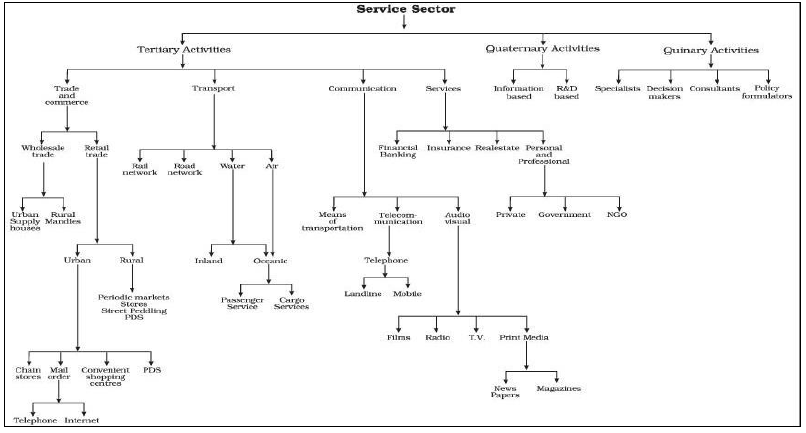📦 Introduction
Tertiary and quaternary activities are part of the service sector. These activities do not produce goods but provide essential services that support the production and distribution processes.
🧠 Mind Map – Tertiary Activities

🚕 Tertiary Activities
- Involve provision of services like transport, communication, trade, and tourism.
- Help in the smooth functioning of primary and secondary sectors.
- Include both personal and professional services.
📊 Examples of Tertiary Activities
- Retail and wholesale trade
- Transport and logistics
- Banking, insurance, and finance
- Health and education
🧠 Quaternary Activities
These activities are related to knowledge, information, and research. They are high-level services requiring specialized knowledge.
- Education
- Research and development
- Information technology
- Consulting and planning
🧬 Quinary Activities
These are services that focus on decision-making and high-level management in society. Often performed by top executives, policymakers, and leaders.
- Government officials
- Corporate executives
- Think tanks and policy researchers
🌍 Outsourcing
Outsourcing refers to the process where companies hire external firms or individuals to perform tasks, or provide services that were previously done in-house. It allows businesses to reduce costs and focus on core activities.
Example: Many companies in the United States and Europe outsource customer service or IT support to countries like India and the Philippines where labor is more affordable and skilled professionals are available.
🌐 Role in Development
The growth of service sectors is an indicator of economic development and modernization. These sectors contribute to GDP and employment in developed and developing nations.
📖 Conclusion
Tertiary and quaternary activities are essential for a knowledge-based economy. They create value by offering services, improving productivity, and enhancing quality of life.